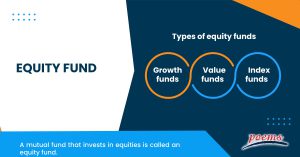Equity fund
Table of Contents
Equity fund
Equity funds are riskier than bond and money market funds, but they have the potential to generate higher returns. Over the long term, equity funds have outperformed other types of investments. However, equity funds are subject to market volatility, and their value can go down in the short term.
Investors interested in equity funds should consider their investment goals and risk tolerance. Growth and value funds may be appropriate for investors looking for capital appreciation; but index funds may be suitable for investors tracking the overall market’s performance.
What is an equity fund?
A mutual fund that invests in equities is called an equity fund. Growth, value, and index equity funds can be generally divided into these three groups. Stocks of businesses that are anticipated to rise faster than the market as a whole are purchased by growth funds. Value funds buy stocks of businesses that the market believes to be undervalued. Index funds follow a particular market index, such as the S&P 500.
Equity funds make investing easier by collecting investor money into a single fund and investing it in various companies. The equity funds gather the returns from companies in the form of dividends and earnings and distribute them to the investors.
Types of equity funds
Many different equity funds are available to investors, each with unique investment objectives and strategies. The most common types of equity funds are growth funds, value funds, and index funds.
- Growth funds
Investments by growth funds are made in businesses that are anticipated to develop faster than average.
- Value funds
Value funds make investments in businesses that the market has undervalued.
- Index funds
Index funds offer exposure to the underlying assets in an index by tracking that index, such as the S&P 500.

Benefits of equity fund
Investing in equity funds has several benefits for investors. Most importantly, equity funds can provide investors with the potential for significant capital growth. Stocks and shares have a history of outperforming other asset classes like cash and bonds over the long term, so investing in an equity fund may help you increase your wealth.
In addition to capital growth, equity funds can also offer investors a degree of income. Many equity funds pay out regular dividends, providing investors with a source of income to supplement any other investments they may have. This can be particularly useful for retirees looking to generate an income from their investments.
Another benefit of equity funds is that they can offer greater diversification than investing in individual stocks and shares. Investing in a fund allows you to receive exposure to a wider range of companies and sectors, which can help reduce your investment portfolio’s overall risk.
So, investing in an equity fund can offer investors several benefits. If you want to expand your wealth and produce income from your assets, an equity fund might be suitable.
How does an equity fund work?
Equity funds can be a good way to diversify your investment portfolio. They can also offer the potential for higher returns than other types of investments, such as bonds and CDs. However, equity funds also come with higher risks, so it’s important to consider your goals and risk tolerance before investing.
Professional money managers manage equity funds. And they use a variety of investment strategies to achieve their investment objectives. Equity funds are subject to market risk, the risk that the price of the securities in the fund will decline.
Features of equity fund
There are several types of equity funds, each with its features and investment objectives. However, all equity funds share some common features.
Firstly, they all invest in equity securities, which are shares of stock in public companies. Active management and passive management are both options for equity funds. Actively managed equity funds are those where the fund manager decides which stocks to buy and sell to beat the market. Equity funds that are passively managed follow a particular market index, such as the S&P 500, without the need for active management.
Equity funds typically charge higher fees than other investment funds due to the higher risk involved in investing in stocks. Over the long run, they may also produce better returns. For this reason, equity funds are often a key component of many investors’ portfolios.
Frequently Asked Questions
You should consider a few factors before investing in an equity mutual fund. The most important thing is to ensure you are at ease with the hazards. Being ready for the ups and downs is essential when investing in equity mutual funds, which can be highly volatile.
There are several benefits to investing in an equity mutual fund. One of the key benefits is that it offers diversification across several different stocks, which can help to mitigate risk.
Equity mutual funds offer higher potential returns than other types of investments, making them an attractive option for investors looking to grow their portfolios. Another benefit of investing in an equity mutual fund is that they are typically managed by experienced professionals, which can help to reduce risk further.
Investors with a longer investing outlook and a higher risk tolerance are best suited for equity mutual funds. While they do have the potential to generate higher returns than other types of investments, they also come with higher risks. As such, they are only suitable for some.
Before investing in equity mutual funds, you should carefully consider your investment goals, risk tolerance, and time horizon. If you are not comfortable with the risks involved, you should invest in other investments.
Related Terms
- Sovereign Wealth Fund
- New fund offer
- Commingled funds
- Taft-Hartley funds
- Umbrella Funds
- Late-stage funding
- Short-term fund
- Regional Fund
- In-house Funds
- Redemption Price
- Index Fund
- Fund Domicile
- Net Fund Assets
- Forward Pricing
- Mutual Funds Distributor
- Sovereign Wealth Fund
- New fund offer
- Commingled funds
- Taft-Hartley funds
- Umbrella Funds
- Late-stage funding
- Short-term fund
- Regional Fund
- In-house Funds
- Redemption Price
- Index Fund
- Fund Domicile
- Net Fund Assets
- Forward Pricing
- Mutual Funds Distributor
- International fund
- Balanced Mutual Fund
- Value stock fund
- Liquid funds
- Focused Fund
- Dynamic bond funds
- Global fund
- Close-ended schemes
- Feeder funds
- Passive funds
- Gilt funds
- Balanced funds
- Tracker fund
- Actively managed fund
- Endowment Fund
- Target-date fund
- Lifecycle funds
- Hedge Funds
- Trust fund
- Recovering funds
- Sector funds
- Open-ended funds
- Arbitrage funds
- Term Fed funds
- Value-style funds
- Thematic funds
- Growth-style funds
- Capital preservation fund
Most Popular Terms
Other Terms
- Physical ETF
- Initial Public Offering
- Buyback
- Secondary Sharing
- Bookrunner
- Notional amount
- Negative convexity
- Jumbo pools
- Inverse floater
- Forward Swap
- Underwriting risk
- Reinvestment risk
- Final Maturity Date
- Payment Date
- Secondary Market
- Margin Requirement
- Mark-to-market
- Pledged Asset
- Yield Pickup
- Subordinated Debt
- Trailing Stops
- Treasury Stock Method
- Stochastic Oscillator
- Bullet Bonds
- Basket Trade
- Contrarian Strategy
- Exchange Control
- Notional Value
- Relevant Cost
- Dow Theory
- Speculation
- Stub
- Trading Volume
- Going Long
- Pink sheet stocks
- Rand cost averaging
- Sustainable investment
- Stop-limit sell order
- Economic Bubble
- Ask Price
- Constant prepayment rate
- Covenants
- Stock symbol
- Companion tranche
- Synthetic replication
- Bourse
- Beneficiary
- Witching Hour
- Widow and Orphan stock
- Public Float
Know More about
Tools/Educational Resources
Markets Offered by POEMS
Read the Latest Market Journal

Back in Business: The Return of IPOs & Top Traded Counters in March 2024
Start trading on POEMS! Open a free account here! At a glance: Major indices continue...

Weekly Updates 15/4/24 – 19/4/24
This weekly update is designed to help you stay informed and relate economic and company...

From $50 to $100: Unveiling the Impact of Inflation
In recent years, inflation has become a hot topic, evoking strong emotions as the cost...

Japan’s Economic Resurgence: Unveiling the Tailwinds Behind Nikkei 225’s Record Leap
Source: eSignal, Intercontinental Exchange, Inc. In the heart of Japan’s economic landscape, the Nikkei 225...

Weekly Updates 8/4/24 – 12/4/24
This weekly update is designed to help you stay informed and relate economic and...

What Makes Forex Trading Attractive?
In a world where the click of a button can send goods across oceans and...

Weekly Updates 1/4/24 – 5/4/24
This weekly update is designed to help you stay informed and relate economic and company...

How to soar higher with Positive Carry!
As US Fed interest rates are predicted to rise 6 times this year, it’s best...












